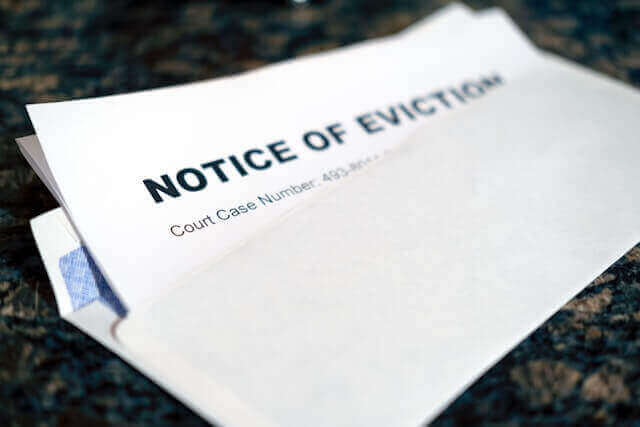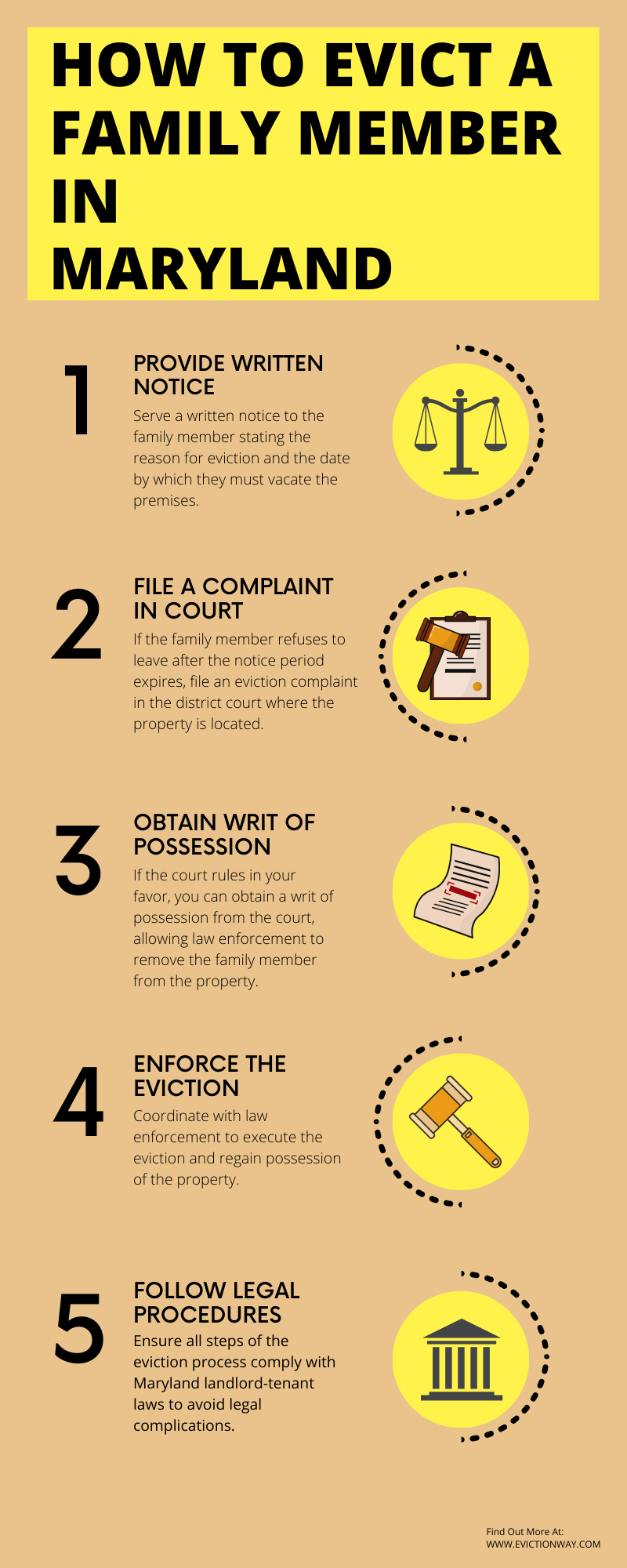Evicting a family member in Maryland can be a daunting task. However, there are legal procedures you can follow to ensure a smooth and lawful eviction process. In this article, we will guide you through the steps involved in evicting a family member in Maryland, providing you with the necessary information and tips to navigate this challenging situation.
To evict a family member in Maryland, you must first establish that they are a tenant and not a legal resident. If they are a tenant, you can proceed with the eviction process by providing them with a written notice to vacate. The notice must state the reason for eviction and the date by which they must leave the property. If they fail to vacate by the specified date, you can file a complaint with the District Court in your county.
It’s important to approach the eviction process with empathy and respect, especially when dealing with family members. Consider seeking legal advice to ensure you follow the proper procedures and protect your rights.

How To Evict a Family Member In Maryland
Evicting a family member can be a difficult and emotional process, but it is important to remember that you have rights as a landlord. If you are a landlord in Maryland and you need to evict a family member, here are six tips to help you through the process:
1. Document Everything
The first step in evicting a family member is to document everything. This includes any late rent payments, lease violations, or other problems that you have had with the tenant. You should also keep a record of all communication with the tenant, including phone calls, emails, and text messages.
2. Give Proper Notice
In Maryland, you must give the tenant at least 30 days’ notice before you can evict them. The notice must be in writing and it must state the reason for the eviction. You can hand-deliver the notice to the tenant or you can mail it to them by certified mail, return receipt requested.

3. File a Complaint with the Court
If the tenant does not vacate the property after you have given them notice, you will need to file a complaint with the court. The complaint should include a copy of the lease, the notice to vacate, and any other documentation that you have.
4. Attend the Court Hearing
Once you have filed a complaint, the court will schedule a hearing. You will need to attend the hearing and present your case to the judge. The tenant will also have the opportunity to present their case.
5. Obtain a Judgment
If the judge rules in your favor, you will be granted a judgment for possession of the property. This judgment will give you the legal right to evict the tenant.
6. Evict the Tenant
Once you have obtained a judgment, you can evict the tenant. You can do this by hiring a sheriff or constable to remove the tenant from the property.
How Much Does it Cost to Evict a Family Member in Maryland?
Evicting a family member can be a difficult and expensive process. The cost of eviction will vary depending on the specific circumstances of the case, but it can easily exceed $1,000.
In addition to court costs, you may also have to pay for a process server, a locksmith, and storage for the evicted person’s belongings.
| Cost Category | Estimated Cost Range (USD) | Notes |
|---|---|---|
| Court Filing Fees | $15 – $130 | Varies by county and the amount of rent in arrears, if any. |
| Process Server Fees | $40 – $100 | Dependent on location and difficulty of service. |
| Attorney Fees | $400 – $5,000+ | Depends on the case complexity and attorney’s rates. |
| Sheriff/Constable Fees | $40 – $100 | Fees for serving an eviction notice and executing eviction. |
| Storage and Moving | $100 – $2,000+ | Costs if the evicted party leaves belongings behind. |
| Locksmith Services | $100 – $300 | If lock change is necessary after eviction. |
| Lost Rent | Varies | The potential rent lost during the eviction process. |
| Property Damage Repairs | Varies | Costs to repair any damages caused by the evicted person. |
If you are considering evicting a family member, it is important to weigh the costs and benefits carefully. Eviction can be a traumatic experience for everyone involved, and it is important to make sure that it is the best option before proceeding.

FAQs: Evicting a Family Member in Maryland
Here are some of the most frequently asked questions about evicting a family member in the Maryland:
What are the legal grounds for evicting a family member in Maryland?
In Maryland, you can evict a family member if they have violated the terms of their tenancy, such as not paying rent or breaking the lease. You can also evict a family member if they are causing a nuisance, such as being disruptive or damaging the property.
What is the process for evicting a family member in Maryland?
The process for evicting a family member in Maryland is similar to the process for evicting any other tenant. You must first give the family member a written notice to vacate. The notice must state the reason for the eviction and the date by which the family member must leave. If the family member does not leave by the deadline, you can file an eviction lawsuit with the court.
Can I evict a family member if they are not on the lease?
Yes, you can evict a family member even if they are not on the lease. However, you must be able to prove that the family member is a tenant. This can be done by showing that the family member has been living in the property for a period of time, has been paying rent, or has been using the property as their primary residence.

What are some tips for evicting a family member in Maryland?
Here are some tips for evicting a family member in Maryland:
- Document everything: Keep a record of all communication with the family member, including any notices to vacate and any court filings.
- Be prepared to go to court: If the family member does not leave by the deadline, you will need to file an eviction lawsuit with the court.
- Get legal help: If you are not comfortable evicting a family member on your own, you should consult with an attorney.
What are the consequences of evicting a family member in Maryland?
Evicting a family member can be a difficult and emotional process. It is important to weigh the potential consequences before taking this step. Some of the consequences of evicting a family member include:
- The family member may become homeless.
- The family member may resent you and other family members.
- The eviction could damage your relationship with the family member.
Related:
